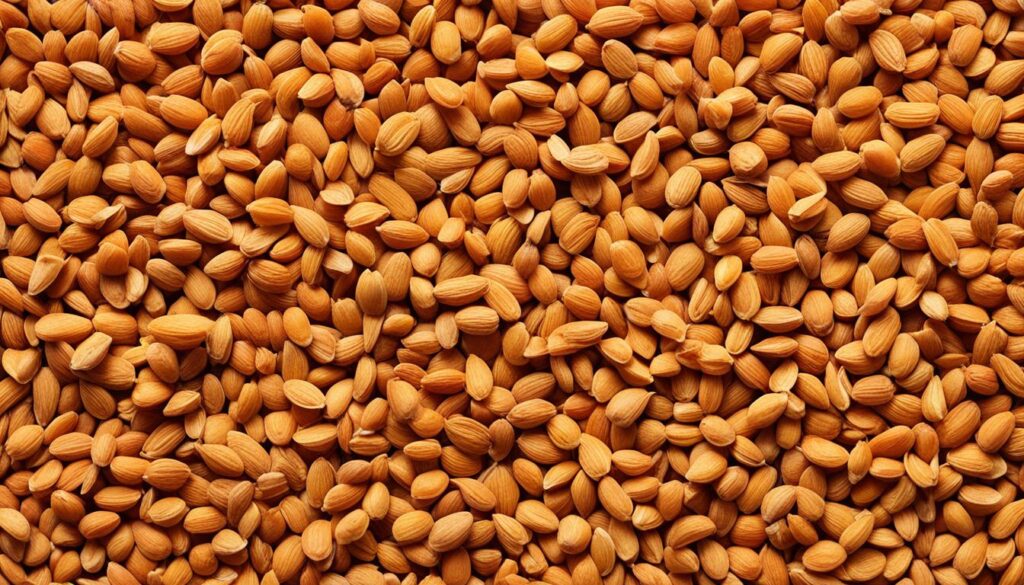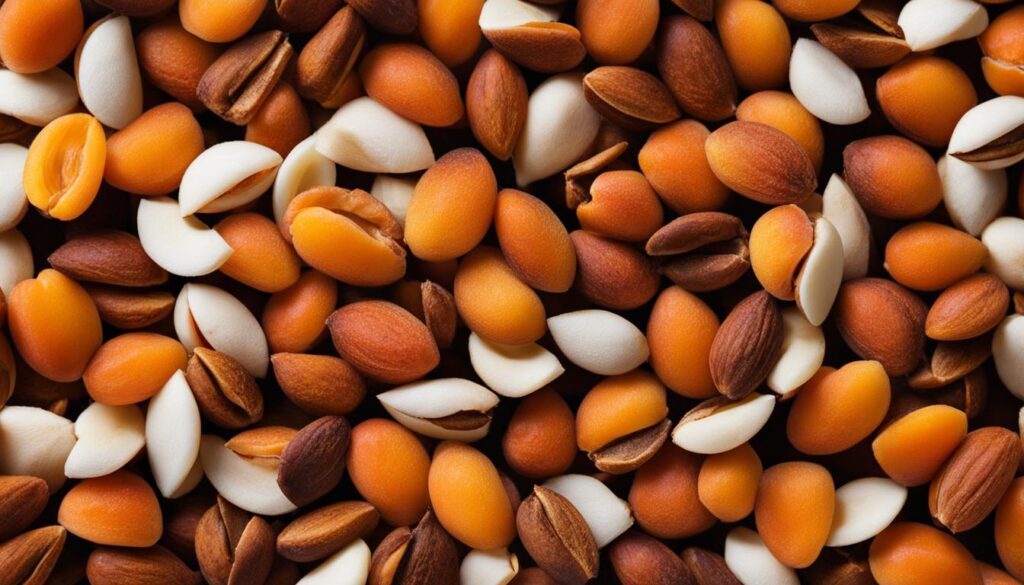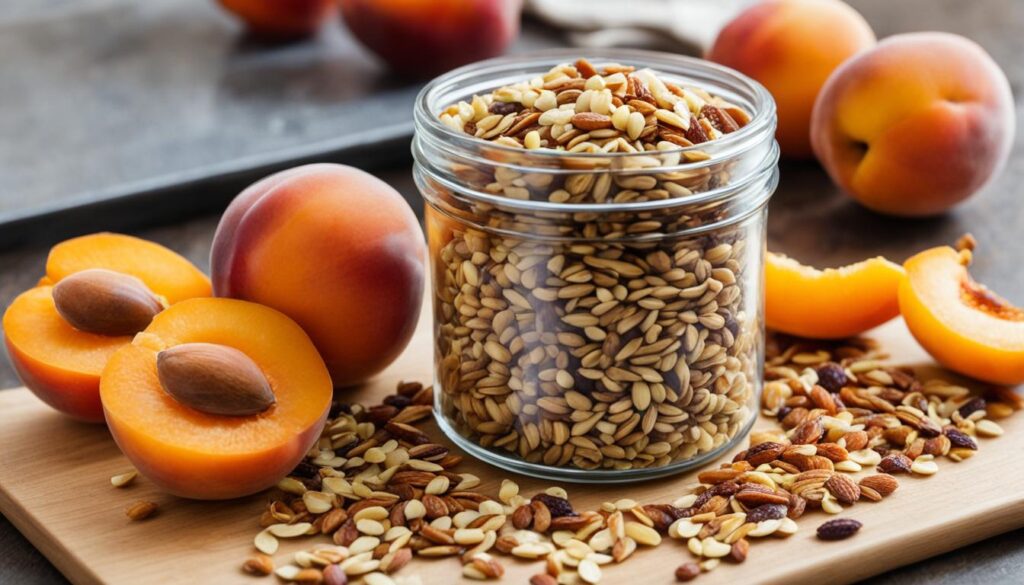Apricot kernels have gained popularity in recent years due to their various uses and potential health benefits. These small seeds are packed with nutrients and are utilized in different industries, including culinary, skincare, and healthcare.
Key Takeaways:
- Apricot kernels are rich in essential nutrients such as vitamin E, fiber, and healthy fats.
- They have culinary applications, adding a unique nutty flavor to dishes.
- Apricot kernel oil is widely used in the cosmetic industry for its nourishing and moisturizing properties.
- They have been used in traditional medicine for their potential health benefits.
- It’s important to consume apricot kernels in moderation and consult a healthcare professional if using them for therapeutic purposes.
History and Origin of Apricot Kernels

Apricot kernels have a rich history dating back centuries, where they have been widely used in traditional medicine and culinary practices. These versatile seeds originated in Central Asia and were later introduced to various parts of the world, including the Middle East, Europe, and North America.
In different cultures and civilizations, apricot kernels have been valued for their numerous health benefits and culinary uses. They were highly regarded for their nutritional value and medicinal properties, making them a staple ingredient in traditional remedies.
The ancient Chinese and Egyptian civilizations recognized the therapeutic potential of apricot kernels and incorporated them into their healing practices. From soothing respiratory ailments to promoting gastrointestinal health, apricot kernels were revered for their diverse medicinal applications.
Throughout history, apricot kernels have been used in various forms. They were consumed both raw and cooked, and their oils were extracted to create topical treatments. Apricot kernel oil, in particular, was highly regarded for its moisturizing and nourishing properties, finding its place in remedies for skin and hair care.
The widespread cultivation of apricot trees and the dissemination of apricot cultivation techniques allowed the proliferation of apricot kernels across different regions. The popularity of these kernels continues to grow today, as people recognize their unique taste, nutritional value, and potential health benefits.
The Significance of Apricot Kernels in Traditional Medicine
Apricot kernels have been valued for their health benefits and culinary uses.
The use of apricot kernels in traditional medicine stems from their rich nutrient profile. These kernels contain essential vitamins, minerals, healthy fats, and potent antioxidants. This unique composition has led to the exploration of their potential therapeutic properties in various cultures throughout history.
Different traditional medicine systems, such as Ayurveda, Traditional Chinese Medicine, and Unani, embraced the use of apricot kernels. In these systems, apricot kernels were believed to promote digestive health, boost respiratory function, and strengthen the immune system.
While traditional knowledge attributes numerous health benefits to apricot kernels, it’s important to note that scientific research is still ongoing to validate their efficacy. It’s always advisable to consult with a healthcare professional before incorporating them into your wellness routine.
Note: The image above represents the historical significance of apricot kernels in traditional medicine and culinary practices.
Properties and Key Components of Apricot Kernels

Apricot kernels possess a range of properties and contain key components that contribute to their unique characteristics and potential health benefits. These kernels are packed with various bioactive compounds, including the compound amygdalin, which is responsible for their distinctive flavor and potential therapeutic properties.
The key components found in apricot kernels include:
- Vitamins: Apricot kernels are rich in vitamins, particularly vitamin E, which is a powerful antioxidant that helps protect the body against oxidative stress.
- Minerals: They also contain essential minerals such as potassium, phosphorus, and magnesium, which are important for proper bodily functions.
- Antioxidants: Apricot kernels are a natural source of antioxidants, including polyphenols and flavonoids, which help combat free radicals and reduce oxidative damage.
- Fiber: These kernels are a good source of dietary fiber, which aids in digestion and promotes a healthy gut.
- Healthy Fats: Apricot kernels contain healthy fats, including monounsaturated fats, which are beneficial for heart health.
These properties and key components contribute to the nutritional value and potential health benefits of apricot kernels. However, it’s important to note that the consumption of apricot kernels should be moderate and in line with recommended guidelines to ensure safety and optimize potential benefits.
Apricot kernels possess a range of properties and contain key components that contribute to their unique characteristics and potential health benefits.
Natural Usage of Apricot Kernels

Apricot kernels have a long history of use in natural medicine for their potential health benefits. They are believed to possess anti-inflammatory, antioxidant, and anticancer properties, making them a popular choice among traditional healers.
One of the traditional uses of apricot kernels is as a natural remedy for coughs and respiratory issues. The kernels are often consumed in the form of teas or decoctions to help soothe the throat and alleviate respiratory discomfort. However, it’s important to note that these uses are based on historical knowledge and may not have scientific evidence to support them.
Apricot kernels have also been used in natural skincare products for their potential benefits. The oil extracted from the kernels is known for its moisturizing and nourishing properties, making it a popular ingredient in facial oils, lotions, and creams. It can help hydrate the skin, improve elasticity, and promote a healthy complexion.
“While apricot kernels have a long history of use in natural medicine and skincare, it’s important to approach their usage with caution and consult with a healthcare professional before incorporating them into your routine.”
It’s important to note that the natural uses of apricot kernels should be approached with caution. While they may offer potential benefits, it’s essential to consult with a healthcare professional before using them for medicinal purposes. Furthermore, it’s crucial to source high-quality kernels and ensure proper dosage and usage to avoid any potential risks or adverse effects.
Summary Table: Potential Natural Uses of Apricot Kernels
| Conditions | Natural Uses |
|---|---|
| Coughs and respiratory issues | Consumed as teas or decoctions for soothing and relief |
| Skin conditions | Incorporated into skincare products for moisturizing and nourishing properties |
| Anti-inflammatory properties | Used in natural remedies for reducing inflammation |
| Antioxidant properties | Considered for potential health benefits due to their antioxidant activity |
| Anticancer effects | Explored for their potential impact on cancer cells |
Culinary Uses of Apricot Kernels

Apricot kernels are a versatile ingredient in the culinary world, particularly in Middle Eastern and Mediterranean cuisines. They add a unique nutty flavor and can be incorporated into various dishes. However, it’s crucial to use them in moderation due to their cyanide content.
Baking and Cooking
One popular way to use apricot kernels is by grinding them into a fine flour and using it in baking recipes. The flour adds a subtle almond-like taste to cookies, cakes, and bread. It’s a great alternative for those looking to add a distinct flavor to their baked goods.
Apricot kernels can also be toasted and chopped before being added to savory dishes. They enhance the flavor of salads, stir-fries, and roasted vegetables, providing a slight crunch and an aromatic note.
Infused Oils and Spreads
Apricot kernels can be infused into oils and spreads, adding a unique twist to your culinary creations. To make infused oil, simply crush the kernels and steep them in a neutral oil, such as olive or grapeseed oil, for a few weeks. The oil can then be used as a flavorful drizzle or as a base for dressings and sauces.
For a spreadable option, blend crushed apricot kernels with honey or nut butter. This combination creates a delicious spread that can be enjoyed on toast, bagels, or as a dip for fruits and vegetables.
Recipes
Looking for some inspiration? Here are a few apricot kernel recipes to get you started:
- Apricot Kernel Granola: Combine oats, chopped apricot kernels, dried fruits, and honey. Bake until golden brown and crispy for a nutritious and delicious breakfast option.
- Apricot Kernel Pesto: Replace traditional pine nuts with crushed apricot kernels when making pesto. The result is a flavorful sauce that pairs well with pasta, grilled meats, or as a spread on sandwiches.
- Apricot Kernel Energy Balls: Blend dried apricots, crushed apricot kernels, dates, and your choice of nuts. Roll the mixture into bite-sized balls for a quick and healthy snack on the go.
Remember, moderation is key when using apricot kernels in your culinary creations. The cyanide content can be harmful when consumed in large amounts. Always follow recipes and guidelines to ensure your safety and enjoy the unique flavor that apricot kernels bring.
Personal Products and Skincare Uses of Apricot Kernels
When it comes to skincare, apricot kernels have gained popularity for their moisturizing and nourishing properties. Apricot kernel oil, extracted from the kernels, is a key ingredient in many personal care products like lotions, creams, and soaps.
Apricot kernel oil is known for its ability to deeply hydrate the skin, leaving it soft and supple. It is rich in essential fatty acids, vitamins A and E, and antioxidants, which help to improve skin elasticity and combat signs of aging.
The oil’s lightweight texture allows it to easily penetrate the skin without clogging pores, making it suitable for all skin types, including oily and acne-prone skin. Its soothing properties also make it beneficial for sensitive or irritated skin.
Another benefit of apricot kernel oil is its gentle exfoliating properties. It contains natural enzymes that help to remove dead skin cells, revealing a brighter and smoother complexion.
Moreover, apricot kernel oil can be used as a carrier oil for essential oils, enhancing their absorption into the skin and amplifying their therapeutic effects.
Whether used alone or in combination with other natural ingredients, apricot kernel oil offers a range of benefits for the skin. Here are a few examples of skincare products and natural remedies that incorporate apricot kernels:
- Apricot kernel oil face serum
- Apricot kernel oil body lotion
- Apricot kernel oil lip balm
- Apricot kernel oil hair mask
- Apricot kernel oil facial scrub
These products harness the power of apricot kernel oil to promote overall skin health and address specific concerns such as dryness, fine lines, and dullness.
| Benefits of Apricot Kernel Skincare | Skincare Products with Apricot Kernel |
|---|---|
| Deeply moisturizes and nourishes the skin | Apricot kernel oil face serum |
| Improves skin elasticity and firmness | Apricot kernel oil body lotion |
| Enhances skin’s natural glow and radiance | Apricot kernel oil lip balm |
| Gently exfoliates and smoothes the skin | Apricot kernel oil hair mask |
| Soothes and calms sensitive or irritated skin | Apricot kernel oil facial scrub |
Adding apricot kernel skincare products to your routine can help you achieve healthier, more radiant skin. However, as with any skincare product, it’s important to do a patch test and consult a dermatologist if you have any specific concerns or allergies.
Household Uses of Apricot Kernels

Apricot kernels offer more than just personal care benefits. They can also be utilized in various household applications, providing natural alternatives for cleaning and beauty. Here are some household uses of apricot kernels:
Natural Cleaning Solutions
Apricot kernels can be used to create eco-friendly and biodegradable cleaning solutions for your home. The natural oils present in the kernels have cleansing properties that can effectively remove dirt, grime, and stains. Here’s a simple recipe for a homemade all-purpose cleaner:
Mix equal parts of distilled water and white vinegar in a spray bottle. Add a handful of crushed apricot kernels to the mixture, then shake well. This solution can be used to clean countertops, surfaces, and even windows.
DIY Beauty Products
Adding apricot kernels to your DIY beauty routine can enhance your skincare and haircare regimen. The gentle exfoliating properties of crushed apricot kernels can help remove dead skin cells and unclog pores, leading to a smoother and healthier complexion. Here’s a simple recipe for a homemade facial scrub:
In a bowl, combine 1 tablespoon of crushed apricot kernels, 1 tablespoon of honey, and 1 tablespoon of yogurt. Mix well to form a paste. Gently massage the scrub onto your face in circular motions, then rinse with warm water. Your skin will feel refreshed and rejuvenated.
Additionally, apricot kernels can also be used in homemade hair masks and bath products to provide nourishment and hydration.
| Household Use | Instructions |
|---|---|
| All-Purpose Cleaner | Mix equal parts distilled water and white vinegar in a spray bottle. Add a handful of crushed apricot kernels, then shake well. Use to clean surfaces. |
| Facial Scrub | Combine 1 tablespoon crushed apricot kernels, 1 tablespoon honey, and 1 tablespoon yogurt. Gently massage onto the face in circular motions, then rinse off with warm water. |
| Hair Mask | Mix crushed apricot kernels with your favorite hair conditioner. Apply to damp hair, leave on for 20 minutes, then rinse thoroughly. |
These are just a few examples of how apricot kernels can be incorporated into your everyday household routines. By utilizing the natural properties of apricot kernels, you can create effective and environmentally friendly alternatives for a cleaner and healthier home.
Benefits and Applications of Apricot Kernels

Apricot kernels offer several potential health benefits that make them a valuable addition to your diet and wellness routine. These kernels are packed with antioxidants, which help protect your cells from damage caused by harmful free radicals. The potential anticancer effects of apricot kernels have also been a topic of interest in the scientific community.
You can incorporate apricot kernels into your daily routine in various ways. One option is to consume them raw or roasted as a snack. This allows you to enjoy their nutty flavor while reaping the potential health benefits. Alternatively, you can use apricot kernel oil or extract in your cooking or baking to add a unique twist to your recipes.
When using apricot kernels for therapeutic purposes, it’s essential to do so with caution. While they contain beneficial compounds, they also contain amygdalin, which can release cyanide when consumed in large amounts. Therefore, it’s crucial to use them in moderation and consult with a healthcare professional before incorporating them into your wellness regimen.
The Potential Benefits of Apricot Kernels:
- Rich in antioxidants that protect against cellular damage
- Possible anticancer effects
- May have anti-inflammatory properties
How to Use Apricot Kernels:
- Consume raw or roasted as a snack
- Add them to your favorite recipes for a nutty flavor
- Use apricot kernel oil or extract in your cooking or baking
Remember, it’s important to prioritize safety when using apricot kernels. Consult with a healthcare professional to determine the appropriate dosage and ensure they are suitable for your individual needs. By using apricot kernels responsibly, you can tap into their potential health benefits and enhance your overall well-being.
Usage Tips and Cautions for Apricot Kernels

When it comes to using apricot kernels, it’s essential to prioritize safety and follow the recommended guidelines. Keep in mind the following tips to ensure you use apricot kernels safely:
- Consume in moderation: Apricot kernels contain amygdalin, a compound that can release cyanide when ingested in large amounts. To avoid potential cyanide poisoning, it’s important to consume them in moderation. The recommended daily intake should not exceed 1-2 kernels per day for adults.
- Source high-quality kernels: Choose reputable suppliers that offer high-quality apricot kernels. Look for organic or pesticide-free options to minimize the risk of chemical residues.
- Proper storage: To maintain the freshness and nutritional value of apricot kernels, store them in an airtight container in a cool, dry place. This helps prevent them from becoming rancid and ensures their optimum quality.
- Consult a healthcare professional: Before incorporating apricot kernels into your diet or using them for therapeutic purposes, it’s advisable to consult with a healthcare professional. They can provide personalized guidance based on your individual health needs and help determine a safe and suitable dosage.
By following these tips and exercising caution, you can safely enjoy the potential benefits that apricot kernels offer.
Note: Always handle and consume apricot kernels responsibly and avoid giving them to children or individuals with certain medical conditions without proper medical advice.
Selecting and Storing Apricot Kernels
When it comes to apricot kernels, choosing the best quality ones is essential to ensure their freshness and nutritional value. Start by selecting kernels that are fresh and free from any signs of mold or damage. This will ensure that you are getting the highest quality product.
Opting for organic or pesticide-free apricot kernels is also recommended. By choosing these options, you can reduce the risk of chemical residues and enjoy a more natural and wholesome product. It’s always worth checking the packaging or speaking to the supplier to confirm their organic or pesticide-free status.
Once you have your apricot kernels, proper storage is crucial to maintain their freshness and prevent rancidity. Store them in an airtight container to protect them from moisture and air exposure. A cool and dry place, such as a pantry or kitchen cupboard, is the ideal location to keep them.
By following these simple tips for selecting and storing apricot kernels, you can ensure that you are getting the best quality and maintaining their optimal freshness. Whether you plan to use them for culinary purposes, personal care products, or natural remedies, it’s important to prioritize their quality for the best results.
FAQ
What are the uses and benefits of apricot kernels?
Apricot kernels have various uses and benefits. They are used in culinary applications for their unique nutty flavor. They are also used in skincare products for their moisturizing and nourishing properties. Apricot kernels are rich in nutrients like vitamin E, fiber, and healthy fats, which offer potential health benefits.
Where do apricot kernels originate from?
Apricot kernels originated in Central Asia and were later spread to other parts of the world. They have a long history of use in traditional medicine and culinary practices in different cultures.
What are the properties and key components of apricot kernels?
Apricot kernels contain bioactive compounds like amygdalin, which is responsible for their unique taste and potential health benefits. They also contain vitamins, minerals, and antioxidants that contribute to their nutritional value and potential therapeutic properties.
How are apricot kernels used in natural medicine?
Apricot kernels have been traditionally used in natural medicine for their potential anti-inflammatory, antioxidant, and anticancer properties. They have also been used as a natural remedy for coughs, skin conditions, and respiratory issues. However, it’s important to note that these uses are based on traditional knowledge and may not have scientific evidence to support them.
In what ways can apricot kernels be used in cooking?
Apricot kernels are commonly used in culinary applications, especially in Middle Eastern and Mediterranean cuisines. They can be ground into a flour and used in baking or added to dishes for a unique nutty flavor. However, it’s important to consume them in moderation, as they contain amygdalin, which can release cyanide in large amounts.
How are apricot kernels used in skincare products?
Apricot kernel oil, derived from the kernels, is widely used in the cosmetic industry for its nourishing and moisturizing properties. It can be found in various personal care products, such as lotions, creams, and soaps. Apricot kernel oil is known for its ability to hydrate the skin, improve skin elasticity, and promote a healthy complexion.
Can apricot kernels be used for household purposes?
Yes, apricot kernels can be used in household applications. They can be used to make natural cleaning solutions and can be added to DIY beauty products like facial scrubs and masks. However, it’s important to use them safely and follow proper guidelines for their use.
What are the benefits and applications of apricot kernels?
Apricot kernels offer several potential health benefits, including their antioxidant properties, potential anticancer effects, and anti-inflammatory properties. They can be consumed in various forms, such as raw, roasted, or in the form of apricot kernel oil or extract. However, it’s crucial to use them in moderation and consult with a healthcare professional before using them for therapeutic purposes.
How should apricot kernels be used safely?
When using apricot kernels, it’s important to follow safety guidelines. They should be consumed in moderation, as excessive intake can lead to cyanide poisoning. It’s crucial to source high-quality kernels and ensure they are properly stored to maintain their freshness and nutritional value. It’s also recommended to consult with a healthcare professional before incorporating them into your diet or using them for therapeutic purposes.
What should I consider when selecting and storing apricot kernels?
When selecting apricot kernels, look for ones that are fresh and free from mold or damage. It’s advisable to choose organic or pesticide-free options to reduce the risk of chemical residues. Apricot kernels should be stored in an airtight container in a cool, dry place to maintain their freshness and prevent rancidity.






